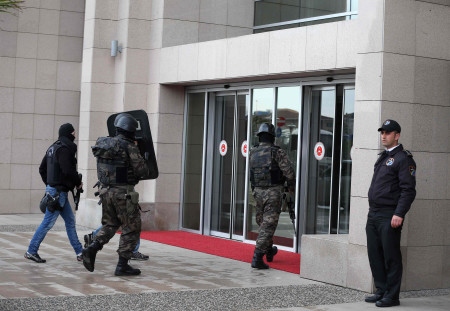The tragic and bloody end to an hours-long hostage standoff inside an Istanbul courthouse on Tuesday has raised the tensions that still linger in Turkey nearly two years after nationwide anti-government protests put the country’s divisions in stark relief.

The standoff began Tuesday afternoon when members of a far-left terrorist organization infiltrated the building and took a prominent prosecutor, Mehmet Selim Kiraz, hostage. They were claiming to seek justice for the youngest person killed during police crackdowns on the so-called Gezi protests. Kiraz was investigating the case surrounding the teenaged boy’s death.
The demands of the terror group — the Revolutionary People’s Liberation Party–Front, known by its Turkish acronym DHKP/C — were relayed on social media and included the televised confession of police officers responsible for the death of the boy, Berkin Elvan, who was hit in the head with a teargas canister and died in a coma months later. They also sought exoneration for any protesters arrested in angry demonstrations in response to Elvan’s death.
The hostage standoff ended after hours of negotiations Tuesday evening when officers dispatched to the scene opened fire after reportedly hearing gunshots. Both assailants were killed, and the prosecutor was shot five times—though it remains unclear by whom. He later died of his wounds. Hundreds gathered to pay tribute to him Wednesday at the courthouse, which remained under tight security.
The death of the prosecutor investigating Elvan’s death has once again pushed the boy’s legacy into the spotlight and highlighted the country’s deep divisions. Since Elvan was injured nearly two years ago, various factions of Turkish society have seized on him as a symbol for their cause.
To many government officials and their supporters—including the country’s president—he was a terrorist himself, from a DHKP/C neighbourhood and a symbol of violent threats against the government. To others he was an innocent bystander, out to buy bread, who lost his life in a reckless government crackdown. The DHKP/C appeared eager to capitalize on the publicity and claim him as one of its own.
The government, meanwhile, has emphasized the role of DHKP-C and other fringe groups in the Gezi protests—which attracted wide segments of society—to advance arguments in favour of tighter security measures.
In a testament to the widespread mistrust of the government that has lingered since Gezi, conspiracy theories circulated. One suggested that the entire hostage situation was staged by the country’s intelligence agency to justify the need for a tough security bill recently passed in parliament. The new bill will permit officers to shoot violent protesters and will enhance police powers in the name of national security.
The bill was prompted by violent protests that raged in the southeastern part of the country last fall that left some 40 people dead. But critics inside and out of parliament expressed fears that the bill would be use to crush the sort of dissent seen at the Gezi protests and lead to more Elvan-like deaths.
These fears have surged since Gezi as hundreds of participants face legal action—accused of everything from resisting arrest to attempting to topple the government. The DHKP/C, meanwhile, has seized on the crackdown, portraying itself as the champion for justice in the Elvan case. The Marxist-inspired group, founded in the 1990’s, came out of dormancy in the last three years, with several high-profile attacks. The group is stanchly anti-NATO, anti-U.S. and anti-government, and as such has targeted the U.S. embassy in Ankara, as well as Turkey’s historic Dolmabahce Palace, which houses the prime minister’s offices.
Their latest high-profile attack Tuesday received marginal support on social media by users agreeing with their message—that vigilantism was the only way Elvan’s family would see justice. But by and large it was strongly condemned. Elvan’s parents, meanwhile, watched the latest turn in the battle over their son’s legacy Tuesday with apparent dismay.
“We want justice. We don’t want anyone to shed even one drop of blood,” his father Sami Elvan said on a video that circulated online. “We don’t want other mothers to cry.”








